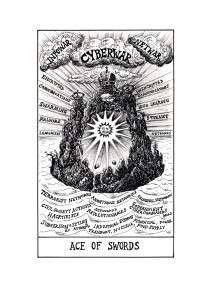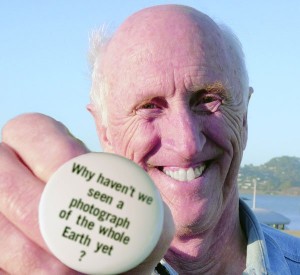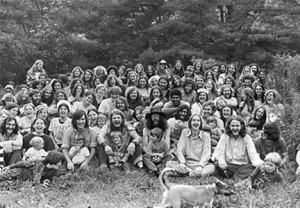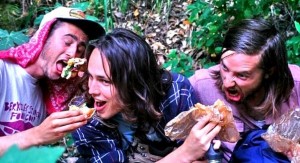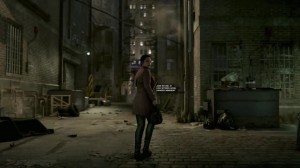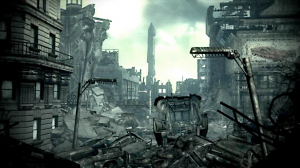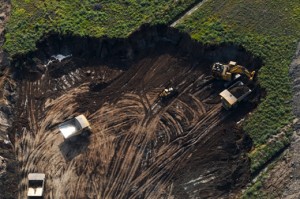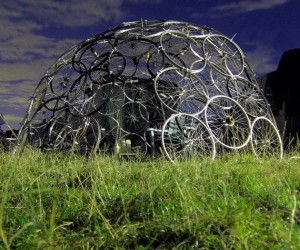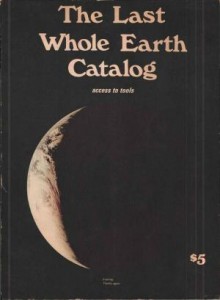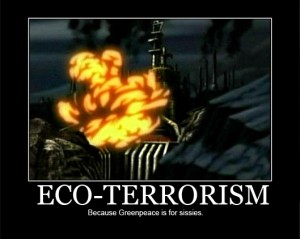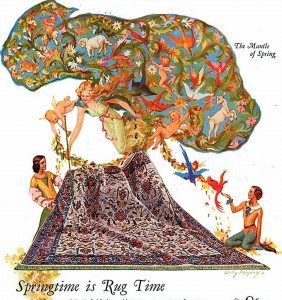RETHINK ENVIRONMENT LEDITOR PART 1
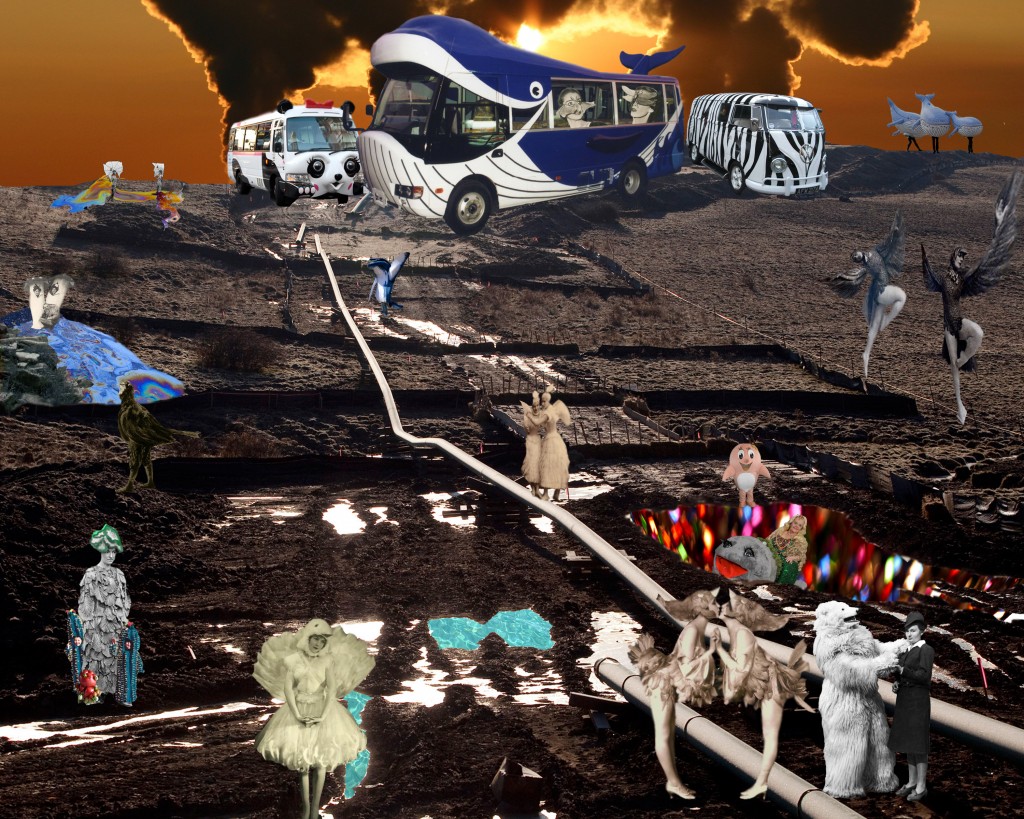 Martabel Wasserman, Future Happening #1, 2014 Martabel Wasserman, Future Happening #1, 2014
Every poster, poem and polemic published in the past eleven issues has come together to make RECAPS a dynamic site for us to collectively theorize the themes we sense in our separate spheres and solitary struggles. As a marker of our second anniversary, we want to push the ways in which RECAPS can be a platform for us to form community. Hence the Rethink Environment Happening this week at Human Resources. It is at once a celebration of our crafts, a critique of the current cultural landscape, and a way for us to rethink what we mean when we talk about environmental symbols, stagings, and politics. In the spirit of making RECAPS deeply anchored in community and collectively produced, we are working more collaboratively as an editorial collective. We have begun to create a structure for ourselves where we can connect, whether over shared meals or video chats, to make the site more comprehensive and complex in its approach to each theme. In the spirit of this paradigm shift, we’ve recently gathered to discuss the launch of this two-part issue. The first half, which you are clicking through now, functions as a primer for our physical event. It features content directly related to the programming this week as well as other original material related to the questions we hope to pose. For our preliminary editorial statement, members of our collective have staged a virtual discussion, in which we’ve reflected on the theme, “Rethink Environment.” Presented below is the seed for the continuation of this issue, a wish list of topics composed out of our conference of budding thoughts. In addition to documenting, archiving, and celebrating our physical event, this second half of the issue will include new content generated through the Happening and elsewhere in solidarity. Please send your submissions to RECAPSmagazine@gmail.com by May 19, 2014.
Content Wish List for Part 2 Transportation. Transhumanism. Space/time. The body as environment. New domesticities. The state of back to the land. Faeries. Quinoa and Kale. Posthumanism beyond the cyborg. Posthuman solidarity. System — open v. closed. Reciprocity. Sharing. Collective action. Embodied/virtual ephemeral communities. Sacred spaces. Nuclear philosophy. Tar pits and tar sands. The sixth extinction. Hormones in the water. Water. Eco-terrorism and eco-chic. Orcas. Toxicity. Sushi. Surveillance and topography. Dissent for satellites. Plastic. The aesthetics of oil. Crystals. Talismans. Myth. Ruin. Science and taxonomy. Growth. RETHINK ENVIRONMENT COLLABORATIVE STATEMENT April 12 -13, 2014 Out of conversations between Cora C, K. Garcia, Kellie Lanham, Christopher J. Lee, Rebecca Lieberman, Colette S, and Martabel Wasserman.
There are elephants everywhere. Some of these totems are older than me, the ones recently acquired on a visit to my grandmother’s. She lives in Palm Desert, in a house on the edge of a golf course. Her concrete backyard has a small turquoise pool where a family of inflatable swans float. I leave that landscape in my mind’s eye and return to the one I am in presently. A green jade elephant my brother brought back from a musical tour of China sits on my bedside table. Hanging from a curtain rod, a necklace with four ivory elephants brings me back to a bus ride through the grey English countryside during which I listened to the Magical Mystery Tour. I presently articulate my life long love of elephants as having to do with the extremity of their simultaneous strength and vulnerability. I thumb through a small book of animal symbols and read the entry for elephants, “Respect traditions- your own and others. Act on what is best for all.” I reach for a rock to hold as I try to write this. Some of the tension we are seeking to address in this two-part Rethink Environment issue and happening is evident in the act of clutching the small pink stone. This thing extracted from the earth comforts me. I surround myself with symbols, seashells, totems, white sage secretly picked from a neighbor’s yard, to create an environment for myself that reflects a desire to connect to the earth. It is how I recharge myself after long commutes for short distances, hours sitting on crumbling infrastructure while my car leaks gas into the atmosphere. Running errands today, the radio reminds this weekend is Coachella. I think of the large gathering in the desert, not far from where my grandmother lives. The desire for communities inching towards the utopic is evident in the festival craze. Burners and music fans mime faeries, feminists, and freaks from the past as they create ephemeral communities where conventions can be eschewed through self-expression and collective intentions. Can our humble happening, our DIY publication, posit some sort of alternative to these commodified experiences? Can we restage the power of past happenings? What are we theorizing, enacting, proposing when we say, “rethink environment?” When we met online this morning as an editorial collective, the broadness and baggage of the terms overwhelmed us. We all played with Google effects; I put on a puppy mask. Perhaps this gesture will unlock something in my theorization of solidarity with animals. Perhaps it is just a way to distract myself from the overwhelming nature of this issue. Trying to editorially frame the issue, we decided to do a mini virtual happening in which we each write about what we hope to evoke with the word environment. My mind bounces from place to place: leaking power plants, separatist communes, memories on public transportation in distant lands and puppy faces on Google hang. I keep trying to return to where I am. A quote Colette wrote on a tiny scroll of paper years ago enters my thoughts. I search my room till I find it curled up in a charm: “And the world cannot be discovered by a journey of miles, no matter how long, but only by a spiritual journey, a journey of one inch, very arduous and humbling and joyful, by which we arrive at the ground at our feet and learn to be at home.” – Wendell Berry, The Unforeseen Wilderness. -MW
First-wave feminism took from existentialism an emphasis on transcending environment, by technology or by force of will. Left it down “there,” somewhere, where also leftist economics, like mainstream economics, consigned it. Raw material to be transformed. Named. Collected. Put to use. All the mastery therein. Nature was cyclical, humans were linear. In appreciating that was bullshit, we got it, that there is no “human,” and no “natural” at all. This might be looking at what we’ve got, this might be earth-worship, this might be cyborgs, this might be mapping strip-malls or satellites or soundwaves. Or this might be creation, as Martabel is creating with her elephants and sage, an aesthetic and spiritual experience that has an other-worldly dimension. Or another dimension of this world. It might still be me, with all the privileges of time and access to beautiful places, painstakingly cataloguing the sap on the grey elbow of a plumeria, or feeling palpably the green of the ivy that used to ring my apartment window in summer. It’s like living under a pair of heavy eyelids of green. Like an old lady whose main solace is her rose garden. Perhaps. All this capacity is, and should, be taking into account that there is not, and never will be, some pure state of nature from which we’ve fallen. I think it’s unfortunate it’s also bred a certain critical distance (which we all identified) from the popular usage of the term environment. Is this just a failing of environmentalism, of the politics of a movement that for too long has been too elitist, too misanthropic, or else too twee and too ineffectual? Even in acknowledging the critical capacity of a term like “environment,” can we totally jettison the meaning of dirt and trees as something naive, inutile for a critical politics? Can we ignore the political realities of that dirt and trees? Should it be our responsibility to reengage the reality if the word seems inadequate? What about the mystic meaning, the idea of a base experience of existence? -CC
-RL |




